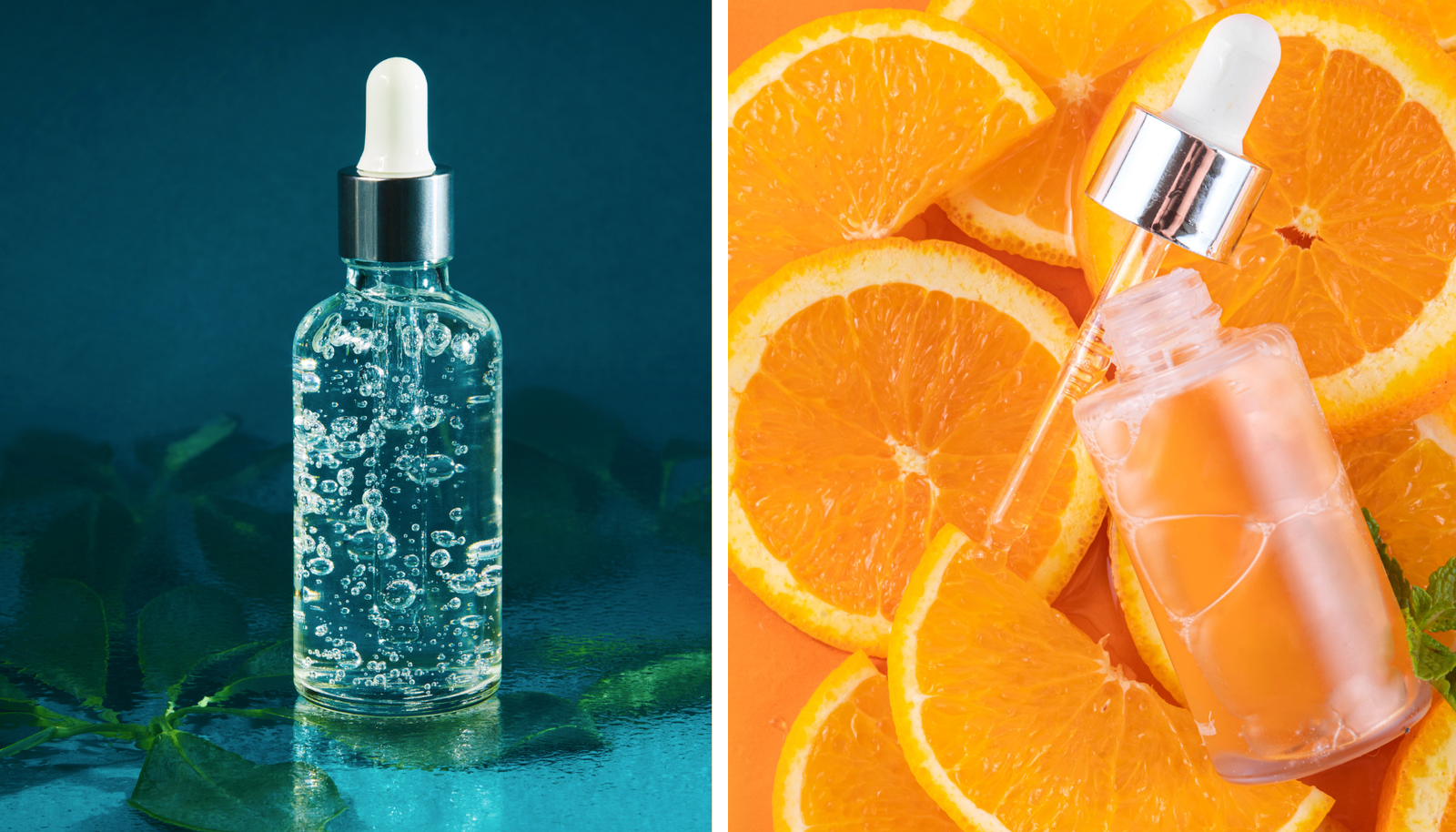Choosing between collagen serum and vitamin C serum is a big decision for those looking to fight aging. Both are key in the quest for a glowing, youthful look. Knowing what each does best can guide you to the right choice for your skin.
The Measurable Difference of Collagen + Vitamin C Serum is a powerhouse. It works deep to reduce dark spots and brighten your skin. It also boosts elasticity and protects against damage for a radiant glow. This serum combines collagen for firmness, and vitamin C for brightness and antioxidants.
"No single serum is a miracle cure. What works best depends on your skin's unique needs. But consistency and a combination of the right ingredients can truly make a difference." Dr. Sarah Matthews
So, when deciding between collagen and vitamin C serums, think about what your skin needs most.
What is Collagen in Serum?
Collagen is a protein that plays a vital role in maintaining skin’s elasticity, firmness, and overall youthfulness. As we age, the natural production of collagen decreases, leading to wrinkles, fine lines, and sagging skin.
“In humans, collagen accounts for one-third of total protein, three-quarters of dry skin weight, and is the most common extracellular matrix (ECM) component.”
There are limitless benefits of Collagen. For this reason, many people now take collagen as a supplement besides to getting it from food sources. Moreover, collagen can be applied topically through skincare products like serums or toners. Using a collagen-rich serum or supplement can help restore this protein, making your skin look better and more resilient.
Most collagen serums are packed with ingredients like peptides, hyaluronic acid, and sometimes retinol, all which help boost collagen levels and improve skin texture.
What is Vitamin C in Serum?
Vitamin C is known for its brightening, anti-aging, and antioxidant properties. It helps to even out skin tone, reduce hyperpigmentation, and protect the skin from free radicals caused by UV exposure and pollution.
“Scurvy, a vitamin C deficient circumstance, is identified by skin weakness, bleeding gums, corkscrew hairs, and delayed wound healing.”
Adding a vitamin C serum or lotion can help lighten existing spots and prevent new ones, giving you a brighter complexion.

Natural vs Synthetic Ingredients: What to Look For
When picking a collagen or vitamin C serum, look at the ingredients’ quality and source. Some products use synthetic ingredients, while others choose natural ones. Knowing the difference helps you choose the right serum for your skin.
Understanding the Differences
Natural collagen, like marine or bovine, boosts skin collagen better. Natural vitamin C, like ascorbic acid, is absorbed and used by the skin more effectively than synthetic versions.
Collagen
Here are some common types of collagens used in skincare and their benefits:
- Hydrolyzed Collagen: 100%
- Marine Collagen: 90%
- Bovine Collagen: 80%
- Plant-Based Collagen Boosters: 70%
- Collagen Peptides: 60%
- Vegan Collagen: 50%
Natural ingredients in skincare, like those from BellaVita Botanics, include:
- Aloe Vera: boosts collagen production, rich in antioxidants and vitamins C and E
- Gotu Kola: known to stimulate collagen synthesis, improves skin elasticity
- Jojoba Oil: hydrates the skin, supports collagen levels, and is non-comedogenic
- Green Tea Extract: packed with antioxidants, helps prevent collagen breakdown
- Avocado Oil: rich in fatty acids, boosts collagen production, and improves skin texture.
Vitamin C
Here are some synthetic vitamin C forms and their strengths:
- L-Ascorbic Acid: 100%
- Sodium Ascorbate: 95%
- Magnesium Ascorbyl Phosphate: 60%
- Sodium Ascorbyl Phosphate: 55%
- Ascorbyl Palmitate: 40%
- Tetrahexyldecyl Ascorbate: 13%
Natural ingredients in skincare, like those from BellaVita Botanics, include:
- Rosehip oil: rich in vitamins C and E, as well as omega-3 and omega-6 fatty acids.
- Apricot kernel oil: an excellent source of phytosterols and tocopherols for all skin types.
- Marula oil: non-comedogenic, rich with antioxidants, and suitable for most skin types.
- Sea buckthorn oil: rich in vitamins C and E, suitable for improving skin texture.
These natural oils help with collagen, dark spots, wrinkles, and skin health. They lock in moisture and protect against damage.
Why Does Your Skin Need Vitamin C and Collagen?
Vitamin C and Collagen are vital for supporting healthy skin. Vitamin C protects and brightens, also boosting collagen production. This combo keeps the skin tight, smooth, and luminous.
Our skin relies on Vitamin C and collagen for its health and vitality. Vitamin C acts as a shield against damage from UV rays and pollution. It prevents early aging, sun damage, and wrinkles. Vitamin C also brightens the skin and fades dark spots. It does this by controlling melanin, giving skin an even tone and glow.
Collagen is a structural protein that provides the skin with firmness, elasticity, and strength. As we age, the natural production of collagen slows down, leading to sagging skin, wrinkles, and fine lines.
As we age, collagen production drops, causing skin to sag and wrinkle. Supplements or products that boost collagen keep skin looking young by improving texture and elasticity.
Skin Concerns Addressed by Collagen Serums
Collagen serums are a strong ally against aging signs. They help restore the skin’s natural collagen, reducing fine lines and wrinkles. This makes the skin firmer and more elastic, revealing a youthful glow.
Reducing Fine Lines and Wrinkles
As we get old, our skin makes less collagen, causing wrinkles. Collagen serums deliver this protein to the skin, making it plump and smooth. Regular use can make wrinkles less noticeable, refreshing your skin.
Boosting Firmness and Elasticity
Collagen serums also help keep the skin’s structure strong. They fill in the skin, making it firmer and more elastic. This is great for those worried about sagging skin, as it plumps and tightens.
Collagen serums are key for anyone fighting aging signs. They improve skin firmness, and elasticity, and reduce wrinkles. This makes your skin look vibrant and youthful.
Skin Concerns Addressed by Vitamin C Serums
Vitamin C serums are great for many skin issues, like dark spots and hyperpigmentation. They work by stopping melanin production, which can cause uneven skin tone. They also protect the skin from damage that can lead to wrinkles and fine lines.
Fading Hyperpigmentation and Dark Spots
Using a vitamin C serum can help lighten dark spots and hyperpigmentation. Look for serums with 10% to 20% L-ascorbic acid for the best results. Serums with more than 8% are usually more effective, but be careful not to go over 20% to avoid irritation.
Protecting Against Free Radical Damage
Vitamin C serums with L-ascorbic acid and vitamin E offer strong protection against damage. Adding ferulic acid can help the serum absorb better. It is also important to preserve these serums in dark glass bottles to keep them fresh and effective.
Collagen Serum vs Vitamin C Serum: Which Should You Choose?
The decision between Collagen Serum vs Vitamin C Serum largely depends on your skin’s needs and goals.
Choose Collagen Serum if:
- You’re primarily focused on improving skin elasticity and reducing the appearance of fine lines and wrinkles.
- You have dry or mature skin that needs an extra hydration boost.
- You want to plump and firm your skin over time.
Choose Vitamin C Serum if:
- You’re looking to brighten your complexion and reduce dark spots or hyperpigmentation.
- You want to protect your skin from environmental damage, like UV rays and pollution.
- You have uneven skin tone or sun damage.

Combining Collagen and Vitamin C to Your Skincare Routine
Best Practices for Application and Use
Adding collagen and vitamin C serums to your skincare routine is important. you get the greatest results, make sure you utilize them appropriately. Both serums need specific ways to apply for maximum benefits.
For collagen serum, gently massage the product into your skin. Use upward circular motions to help it absorb better. Vitamin C serums might cause some tingling, especially if your skin is sensitive. Start with a small amount and gradually increase as your skin gets used to it.
It’s crucial to follow the right usage guidelines. Apply both serums to clean, dry skin before moisturizing. This lets the ingredients work their best on your skin.
By following these tips, you’ll get the most out of your collagen and vitamin C serums. This will make your skin appear younger and healthier.
Product Recommendations for Collagen Serum
After trying various products over the years, here are a few standout collagen serums:
- Algenist Genius Liquid Collagen: This serum is packed with vegan collagen and microalgae oil to deeply hydrate and firm the skin.
- LuminaSkin Triple Lipid Restore 2:4:2: Known for its collagen-boosting effects and ability to restore skin’s barrier.
- Dennis Gross C+ Collagen Brighten & Firm Vitamin C Serum: A two-in-one that brightens and firms using both Vitamin C and collagen-stimulating ingredients.
Product Recommendations for Vitamin C Serum
Here are a few top-tier Vitamin C serums that have shown great results:
- SeoulCeuticals Korean Skin Care 20% Vitamin C Hyaluronic Acid Serum: This is a gold standard Vitamin C serum known for its brightening and anti-aging benefits.
- Drunk Elephant C-Firma Day Serum: A potent blend of antioxidants and fruit enzymes that help brighten the skin and improve texture.
- La Roche-Posay Pure Vitamin C Face Serum: A budget-friendly option that delivers great results for sensitive skin types.
Summary: My Personal Experience
If I had to choose between Collagen Serum vs Vitamin C Serum, I wouldn’t! Both have played a vital role in my skincare routine. When I was in my early 30s, Vitamin C was my go-to for brightening and protecting my skin from sun damage.
But as I’ve gotten older, collagen serums have become essential in keeping my skin plump and hydrated. If you’re in your 20s or early 30s, start with Vitamin C to prevent damage and brighten your complexion. But as you age, consider adding a collagen serum for its long-term anti-aging benefits.
At the end of the day, the right choice comes down to your specific skin needs. If possible, consult with a dermatologist to figure out which will suit your skin type best.
Frequently Asked Questions
Q: What is the main difference between collagen serum and Vitamin C serum?
A: The main difference is that collagen serum focuses on improving skin firmness and elasticity by replenishing collagen, while Vitamin C serum brightens skin, reduces hyperpigmentation, and protects against free radical damage.
Q: Can You Use Collagen and Vitamin C Serum Together?
A: Absolutely! In fact, pairing Collagen Serum vs Vitamin C Serum can be a powerful combo. Vitamin C can help stimulate collagen production, while collagen serums provide hydration and firming benefits. You can layer Vitamin C serum in the morning (it helps protect against free radical damage) and use collagen serum at night for skin repair and hydration.
Q: Which serum is better for anti-aging: collagen or Vitamin C?
A: Both have anti-aging benefits. Collagen serum helps reduce wrinkles and firm skin, while Vitamin C serum boosts collagen production and protects against environmental damage.
Q: Can Vitamin C serum irritate sensitive skin?
A: Yes, Vitamin C can sometimes cause irritation, redness, or stinging, especially if you have sensitive skin. It’s best to start with a lower concentration and gradually increase.
Q: Does collagen serum really rebuild lost collagen in the skin?
A: Topical collagen serums can’t penetrate deep enough to rebuild collagen significantly, but they help hydrate, plump, and firm the skin’s surface.

